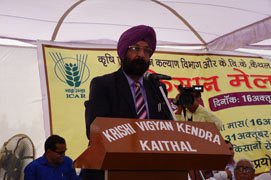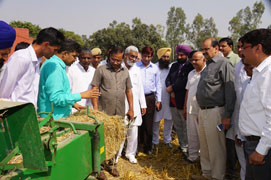16th October, 2016, Kaithal, Haryana
Punjab and Haryana, the heartland of Green Revolution, burning crop residues not only leads nutrient loss and soil biodiversity but also contributes significantly to global warming as well as respiratory diseases among human beings. This cannot be dealt and address in isolation and technologies alone are not sufficient to address this challenge until there is awareness among the whole social system. The ICAR-Agricultural Technology Application Research Institute (ICAR-ATARI), Zone-1 through KVKs of Haryana and Punjab, ICAR institutes, State Department of Agriculture, farmers’ organizations and other sections of society is organizing Chetna Mas (month) for Awareness on Residue Burning (16 October to 15 November 2016).


A Kisan Sammelan was organised today at KVK, Kaithal, in association with Agriculture department to sensitize farmers about the ill effects of residue burning and making awareness about available technology options to manage residue.
The highlight of the programme was Farmers to Farmers Dialogue (F2FD) and live demonstrations on various machineries (Happy seeder, residue baler, chopper, spreaders etc) for residue management.
Dr. Gurbachan Singh, Chairman, ASRB & Chief Guest of the Sammelan initiated the ‘Chetna Month’ and informed that crop residue can be used for soil health improvement, reducing pollution, increasing productivity and increasing sustainability and resilience of agriculture. He advised the farmers to adopt resource conservation technologies under the changing scenario of climate change. In his presence, all the farmers and farm women took oath not to burn residue.
Dr. K. P. Singh, VC, CCSHAU, Hisar urged the farmers restrain from residue burning and use residue as mulching material which will work as nutrient for the next crop. He also informed the importance of soil organic carbon (SOC) in sustainability and methods to improve SOC. He advised the farmers to adopt resource conservation technologies under the changing scenario of climate change.
Dr. V. P. Chahal, ADG (Agri. Ext.) and Dr. Randhir Singh, ADG (Agri. Ext) urged the scientists to work in close association of agriculture department for larger impact and all out efforts should be made to reach farmer to reduce the problem of residue burning.
Dr. Rajbir Singh, Director, ATARI, Ludhiana while explaining the purpose of the Sammelan narrated success stories of many farmers who are not burning residue and how young farmers are minting money out of residue management.
Dr. P. C. Sharma, Director, CSSRI, Karnal and Dr. G. P. Singh, Director, IIWBR and Dr. S. S. Siwach, Director (Agri. Ext.), CCSHAU also addressed the gathering.
More than 1500 farmers and farm women participated in the Sammelan.
(Source: ICAR-Agricultural Technology Application Research Institute, ICAR-ATARI, Ludhiana)







फेसबुक पर लाइक करें
यूट्यूब पर सदस्यता लें
X पर फॉलो करना X
इंस्टाग्राम पर लाइक करें